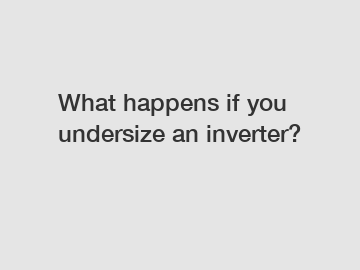What happens if you undersize an inverter?
Have you ever wondered what could happen if you undersize an inverter? In this article, we will explore the potential consequences of choosing an inverter that is too small for your needs. Let's dive in and find out more!
What is an inverter?
Before we delve into the effects of undersizing an inverter, let's first understand what an inverter actually is. An inverter is a device that converts direct current (DC) into alternating current (AC). In other words, it takes the electricity generated by solar panels or batteries, for example, and converts it into a form that can be used to power household appliances.

Consequences of undersizing an inverter.
1. Reduced efficiency: One of the most immediate effects of choosing an inverter that is too small for your needs is reduced efficiency. When an inverter is undersized, it may struggle to meet the demands of your electrical devices, leading to inefficiencies in the conversion process.
2. Overloading: Another consequence of undersizing an inverter is overloading. When an inverter is not able to handle the amount of power being generated, it can become overloaded. This can cause the inverter to overheat and potentially fail, putting your entire electrical system at risk.
3. Reduced lifespan: Continuously running an undersized inverter can also shorten its lifespan. The strain of trying to keep up with the power demands can cause wear and tear on the device, leading to premature failure.
Additional reading:22kW Three-Phase EV Charging - Is It Worth It?
Revolutionizing Energy Efficiency: The Rise of Senergytec?
Top Ev Charger Vendor: Everything You Need to Know
Converting from Single to 3 Phase Inverter
How do I find a cheap single gun AC 7kW slow charging pile?
How to choose a power inverter for your specific needs?
What is the Advantage and Disadvantage of Ev Charging Station Suppliers
4. Malfunctioning appliances: In some cases, undersizing an inverter can also result in malfunctioning appliances. If the inverter is not able to provide a consistent and stable supply of power, it can cause fluctuations in voltage that can damage sensitive electronic devices.
5. Safety hazards: Finally, undersizing an inverter can create safety hazards. Overloading, overheating, and fluctuations in voltage can all pose risks to your electrical system and potentially lead to dangerous situations such as fires.
What to do if you've undersized your inverter.
If you suspect that you have undersized your inverter, it's important to address the issue as soon as possible. Contact a professional supplier or electrician to discuss your options. They can help you determine the correct size of inverter for your needs and assist you in replacing the undersized device.
Conclusion.
In conclusion, undersizing an inverter can have a range of negative consequences, from reduced efficiency to safety hazards. If you suspect that you have undersized your inverter, don't wait to take action. Contact us today to speak with a professional supplier who can help you find the right solution for your needs.
Remember, it's always better to invest in the correct size of inverter upfront than to deal with the potential consequences of undersizing later on. Your electrical system and appliances will thank you for it!
If you want to learn more, please visit our website what appliances can run on inverter, solar panel three phase, odm solar inverter.
Additional reading:The Complete Buyer's Guide to Wire Rope: Which Type is ...
Revolutionizing Energy Future: Hybrid Storage Inverters?
What is a solar inverter and how does it work?
What Are the Benefits of New Energy Charging Pile Design?
Unveiling the Advantages of 3 Phase Solar Panels
How to Choose Complete EV Solutions: A Step-by-Step Guide
How to Choose How to Choose Inverter: A Step-by-Step Guide
Previous: Upgrade Your Home with the Best EV Chargers: Your Complete Guide
Next: Is a higher voltage DC fast charger worth the purchase?
Related Articles
If you are interested in sending in a Guest Blogger Submission,welcome to write for us!












Comments
0